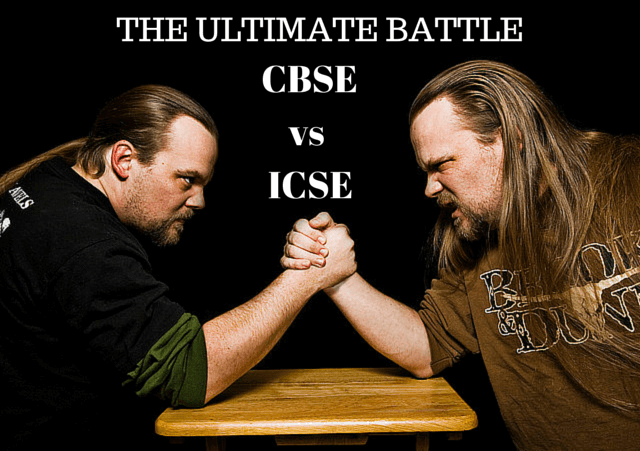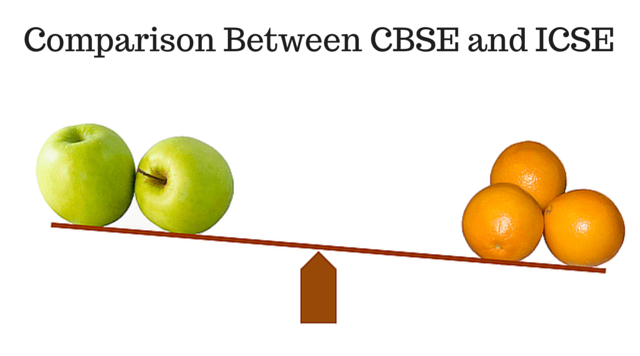
Everybody has an opinion. People who like CBSE will tell you that it’s the best board for JEE and NEET preparation. CISCE supporters will say you’ll understand concepts better in ICSE/ ISC board.
So the question is –
Which board is better for JEE/ NEET aspirants – CBSE or ICSE?
In this post, we will try to answer this question by comparing CBSE vs ICSE in terms of JEE/ NEET selection, syllabus, books, learning, difficulty level, exam friendliness, etc.
Table of contents :
- What makes CBSE better than ICSE for JEE/NEET?
- What makes ICSE better than CBSE?
- Difference between CBSE and ICSE Board
- Comparison between CBSE and ICSE Board
- Difference between CBSE and ICSE Syllabus
- CBSE or ICSE for IIT JEE Preparation
- CBSE or ICSE for NEET Preparation
- ICSE or CBSE, Which is tough?
- Can State Board students crack JEE/ NEET?
- What about IB and IGCSE boards for IIT JEE and NEET?
- Which Board is Best for JEE/ NEET – CBSE or ICSE?
Update : CISCE has realigned Physics, Chemistry, Mathematics and Biology syllabus of class 11 and 12 with that of the CBSE. The difference in ICSE/ ISC and CBSE syllabus is diminishing. Some of the points in this post are not valid now.
What makes CBSE better than ICSE for JEE/ NEET?
CBSE class 11 and 12 syllabus is ideal for the preparation of JEE/ NEET for beginners. The general past trend is in favor of CBSE on the number of students qualified for IIT JEE and NEET.
Some of the past students of ICSE board feel that, till class 10, ICSE is good. The in-depth learning in ICSE board allows students to excel in any field. But for class 11 and 12, students would like to prefer CBSE over ICSE.
CBSE board follows NCERT textbooks which are recommended books for JEE and NEET.
What makes ICSE better than CBSE?
The diverse learning opportunity allows an ICSE student to excel in any field, not just engineering and medical.
An ICSE student, who chose to be anonymous, thinks that CBSE students take more time to grasp a topic and call them “less efficient and bookworms”.
“The kind of education CISCE delivers demands respect for knowledge. Whatever you learn, you value it. You don’t mug it for topping exams, you learn it because you respect it due to the importance it has in our lives.”
Difference between CBSE and ICSE Board
CBSE is an all India government recognized board. CBSE affiliates all Kendriya Vidyalayas, Jawahar Navodaya Vidyalayas, private schools, and most of the schools approved by the central government of India.
The council for the Indian School Certificate Examinations (CISCE) is one of the private national level boards for providing quality education to students. The council every academic year conducts Indian Certificate of Secondary Education (ICSE) for 10th as well as Indian School Certificate (ISC) exams for 12th class.
Comparison between CBSE and ICSE Board

CBSE has a universal pattern and syllabus for all CBSE affiliated schools in India and also in other countries. Currently there are more than 20 thousands schools affiliated with CBSE in India. CBSE affiliated schools also have a presence in more than 30 countries like UAE, Qatar, Bahrain, Malaysia, etc.
Currently there are more than 3000 ICSE affiliated schools in India. Apart from that, there are schools affiliated to ICSE in countries like UAE, Indonesia and Malaysia.
CBSE is a good option for parents who have transferable jobs, they can easily get CBSE affiliated school in every Indian city. There are less number of ICSE affiliated schools, so you may not find an ICSE school if you are moving to a new city.
CBSE is more focused towards science and mathematics with lots of attention paid to the application of knowledge. CISCE (ICSE), on the other hand, is more balanced with equal focus on language, arts and science.
Easy to find quality teachers and books for CBSE. There is a difficulty in finding good quality teachers for ICSE.
Several entrance tests, scholarship and talent search exams have their syllabus based on CBSE board. ICSE syllabus is more diverse and can help you in improving your analytical skills.
Difference between CBSE and ICSE Syllabus
All CBSE schools follow standard NCERT books. NCERT textbooks are composed by highly qualified professors and lecturers of various prestigious universities in India, and thus recommended for JEE and NEET preparation.
Till class 10, CBSE students don’t have a need to study extra books in addition to NCERT except some sample paper books. In class 11 and 12, there are many reference books that are available for better understanding and solving problems for JEE/ NEET.
On the other hand, ICSE syllabus covers a range of topics to explore overall growth of students. The ICSE syllabus is deep enough yet diverse that it can give a very good grasp on the concepts and ideologies taught (applicable to all science, commerce and arts related subjects).
CBSE or ICSE for IIT JEE Preparation
Let’s see a couple of responses by students on CBSE vs ICSE for JEE.
“ICSE board has a vast syllabus for students in class 11 & 12. It doesn’t make sense for an engineering aspirant to study English literature books, poem books and short stories books.”
“ICSE board puts huge pressure on boards over students, making them devoting less time for their main subjects of Physics, Chemistry and Mathematics. If you want to prepare for IIT JEE, ICSE is not a recommended board in class 11 and 12″
Keep in mind that these are the general opinions and not the verdicts. Just getting admitted to a CBSE board won’t guarantee you a seat in an IIT.
For a JEE aspirant, it also depends on the mentality of the student. A student can be capable of handling the extra subjects in ICSE with ease, may enjoy reading literature books and feel better preparing for any examination.
CBSE or ICSE for NEET Preparation
If we compare the two boards, CBSE students are clearing NEET more than their ICSE counterparts. This is also because there are more students enrolled in CBSE than ICSE board.
NCERT books of Biology, Chemistry and Physics in class XI and XII are highly recommended for the preparation of NEET-UG.
Before class 11, ICSE syllabus allows different books of Physics, Chemistry and Biology which provides a very good learning platform for students.
An ICSE student Shruti Mishra, who cleared AIPMT, says this :
“Most of the topics in the CBSE syllabus of class 11th Biology, I had already learned those in my class 9th!”
So even though CBSE syllabus gives you an advantage in the preparation for NEET, ICSE allows you to acquire the required concepts in lower classes.
ICSE or CBSE, Which is tough?
ICSE is generally tougher than CBSE because of the diverse syllabus. The difficulty level of CBSE or ICSE may differ for each student. A tough subject or a complex problem for one student can be an easy one for another student.
Can State Board students crack JEE / NEET?
Yes, state board students can crack NEET and JEE. Many state board students give the JEE/ NEET exams every year, whether they are from Kerala, Tamil Nadu, Karnataka, Andhra Pradesh, Telangana, Maharashtra or other state boards in India.
What about IB and IGCSE boards for IIT JEE and NEET?
IB (International Baccalaureate) and IGCSE (International General Certificate of Secondary Education), both are international boards. Recognized by most of the universities of the world, IB and IGCSE students can apply to foreign universities.
According to a principal of an IB recognized school in New Delhi,
“Unlike CBSE/ CISCE, the IGCSE curriculum is so timed that students can take some ‘A’ Level exams by November every year, be left with ample time to prepare for IIT JEE and NEET tests and then take the other ‘A’ Level subjects.”
Which Board is Best for JEE/ NEET – CBSE or ICSE?
CBSE board is the preferred choice of students and parents largely because of JEE/NEET favorable syllabus and NCERT textbooks. This doesn’t mean ICSE board students don’t crack JEE and NEET exams. If you are taking coaching for JEE or NEET, it doesn’t matter which board you choose – CBSE or ICSE.
Related Posts :
Engineering or Medical- Which Career to Choose?
JEE vs NEET – Which is Better?
We’re listening to students.
Have something to say or any question in mind? Share it with us on Facebook or Twitter
Image Source: Flickr

